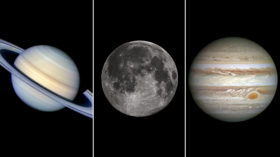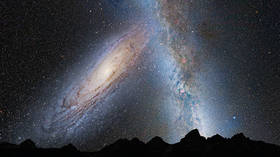Magic moments: Jupiter, Saturn and Moon to align this weekend in nighttime spectacular

Astronomers lamenting the temporary loss of Venus and Mars in the sky as they take a trip around the far side of the Sun, will want to dust off their telescopes this weekend as the sky is set to be packed with stunning sights.
Jupiter will (briefly) assume the title of brightest planet in the night sky as Venus and Mars disappear from view. The so-called Waxing Gibbous Moon (nearly full moon) will appear alongside Jupiter on Saturday night and will be visible from dusk.
Saturn will also appear at night and will be visible, east of Jupiter, until dawn. The Moon will appear to the right of Saturn on the night of August 11 and to the left on August 12, yielding multiple opportunities for some rare group photos.
Also on rt.com Comet me, bro! What are your chances of finding a crashed meteorite on Earth?Experiencing some mild FOMO, Mercury will also make an appearance in the eastern sky as dawn arrives on Monday.
All of these magical moments will play out against the backdrop of the Perseid meteor shower will also near its peak on Monday just before the full moon on August 15 which will, sadly, drown out the celestial firecrackers.
Budding space photographers should be able to catch a group photo on any of the nights from Friday to Monday. For best viewing, NASA recommends getting away from the city lights, bringing a blanket or a sun lounger, and lying flat on your back, looking skywards for about 30 minutes to allow your eyes to adjust properly to the darkness.
Think your friends would be interested? Share this story!














